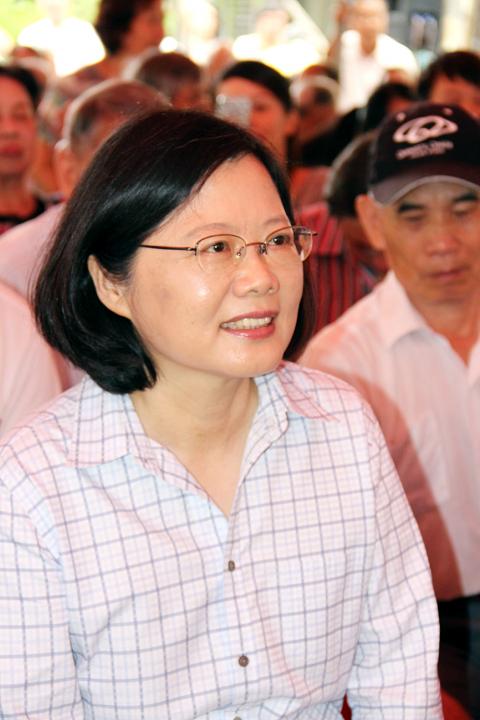The establishment of a medical team with credibility and expertise to look after imprisoned former president Chen Shui-bian (陳水扁) would be in the interests of the country and society, former Democratic Progressive Party chairperson Tsai Ing-wen (蔡英文) said yesterday.
Tsai made the remarks on the sidelines of a DPP event in Miaoli City in response to media inquiries following reports on Chen’s ill health.
Chen is currently serving a 17-and-a-half-year sentence in Taipei Prison for corruption. Concerned over the conditions of his confinement, and mental and physical condition, two US lawmakers last week submitted a report to the Tom Lantos Human Rights Commission calling for immediate medical parole for Chen.

Photo: CNA
Founder of the Human Rights Action Center, John Healey, has also recently written an open letter to President Ma Ying-jeou (馬英九) appealing for better healthcare and cell conditions for Chen.
Tsai yesterday urged the Ma administration to “seriously consider” the establishment of a credible medical team to conduct physiological and psychological examinations on Chen.
The government should take the former president’s health and the medical care he receives seriously, Tsai said.
Meanwhile, Tsai, in an interview with the Hong Kong-based Chinese-language Apple Daily, published yesterday, reiterated that she does not rule out visiting China if there are no preconditions.
If she could visit China the same way she visited Japan and the US, with no conditions attached, “Why not [make the trip]?” Tsai said.
“But I’m not going anywhere as you can see, which tells you that the problem is on the Chinese side,” she added.
Speaking on the issue of the democratic movement in Hong Kong, Tsai said both Hong Kong and Taiwan face the same issue.
“We both have to deal with the Chinese Communist Party,” she said.
Respect should be the key word in China’s interaction with Hong Kong and Taiwan, Tsai said, adding that Beijing did not respect Taiwan, as could be seen from its interference and coercion of Taiwanese society, and that its fingerprints had been everywhere on the election for Hong Kong’s chief executive.
“Beijing must respect democracy in Taiwan and Hong Kongers’ calls for direct elections and democracy,” she said.
Tsai, who represented the DPP in the presidential election in January, was still tight-lipped on whether she was considering running in the 2016 presidential election, but said that she would like to help establish and coordinate social movements in Taiwan.
The development of social movements would be the next important step in the democratic movement in Taiwan, Tsai said.
“As a politician, you have to participate in the movement. You have to be ready to help,” she said.

A preclearance service to facilitate entry for people traveling to select airports in Japan would be available from Thursday next week to Feb. 25 at Taiwan Taoyuan International Airport, Taoyuan International Airport Corp (TIAC) said on Tuesday. The service was first made available to Taiwanese travelers throughout the winter vacation of 2024 and during the Lunar New Year holiday. In addition to flights to the Japanese cities of Hakodate, Asahikawa, Akita, Sendai, Niigata, Okayama, Takamatsu, Kumamoto and Kagoshima, the service would be available to travelers to Kobe and Oita. The service can be accessed by passengers of 15 flight routes operated by

Alain Robert, known as the "French Spider-Man," praised Alex Honnold as exceptionally well-prepared after the US climber completed a free solo ascent of Taipei 101 yesterday. Robert said Honnold's ascent of the 508m-tall skyscraper in just more than one-and-a-half hours without using safety ropes or equipment was a remarkable achievement. "This is my life," he said in an interview conducted in French, adding that he liked the feeling of being "on the edge of danger." The 63-year-old Frenchman climbed Taipei 101 using ropes in December 2004, taking about four hours to reach the top. On a one-to-10 scale of difficulty, Robert said Taipei 101

MORE FALL: An investigation into one of Xi’s key cronies, part of a broader ‘anti-corruption’ drive, indicates that he might have a deep distrust in the military, an expert said China’s latest military purge underscores systemic risks in its shift from collective leadership to sole rule under Chinese President Xi Jinping (習近平), and could disrupt its chain of command and military capabilities, a national security official said yesterday. If decisionmaking within the Chinese Communist Party has become “irrational” under one-man rule, the Taiwan Strait and the regional situation must be approached with extreme caution, given unforeseen risks, they added. The anonymous official made the remarks as China’s Central Military Commission Vice Chairman Zhang Youxia (張又俠) and Joint Staff Department Chief of Staff Liu Zhenli (劉振立) were reportedly being investigated for suspected “serious

Taiwanese and US defense groups are collaborating to introduce deployable, semi-autonomous manufacturing systems for drones and components in a boost to the nation’s supply chain resilience. Taiwan’s G-Tech Optroelectronics Corp subsidiary GTOC and the US’ Aerkomm Inc on Friday announced an agreement with fellow US-based Firestorm Lab to adopt the latter’s xCell, a technology featuring 3D printers fitted in 6.1m container units. The systems enable aerial platforms and parts to be produced in high volumes from dispersed nodes capable of rapid redeployment, to minimize the risk of enemy strikes and to meet field requirements, they said. Firestorm chief technology officer Ian Muceus said